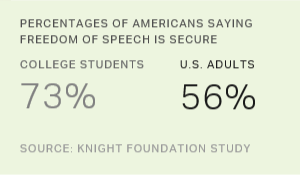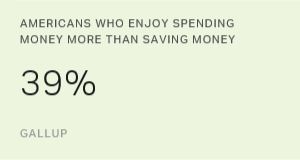Story Highlights
- 72% oppose restrictions on expression of offensive political views
- Students favor restrictions on slurs, stereotypical costumes
- Most say students should not be able to block press access to protests
PRINCETON, N.J. -- U.S. college students mostly reject the idea that colleges should be able to establish policies restricting the expression of political views that upset or offend certain groups. At the same time, students support restricting language or expression that intentionally hurts or offends others, such as using racial or ethnic slurs or wearing costumes that stereotype certain groups.
| Should be able to restrict% | Should not be able to restrict% | ||||||||||||||||||||||||||||||||||||||||||||||||||||||||||||||||||||||||||||||||||||||||||||||||||
|---|---|---|---|---|---|---|---|---|---|---|---|---|---|---|---|---|---|---|---|---|---|---|---|---|---|---|---|---|---|---|---|---|---|---|---|---|---|---|---|---|---|---|---|---|---|---|---|---|---|---|---|---|---|---|---|---|---|---|---|---|---|---|---|---|---|---|---|---|---|---|---|---|---|---|---|---|---|---|---|---|---|---|---|---|---|---|---|---|---|---|---|---|---|---|---|---|---|---|---|
| Using slurs and other language on campus that is intentionally offensive to certain groups | 69 | 31 | |||||||||||||||||||||||||||||||||||||||||||||||||||||||||||||||||||||||||||||||||||||||||||||||||
| Wearing costumes that stereotype certain racial or ethnic groups | 63 | 37 | |||||||||||||||||||||||||||||||||||||||||||||||||||||||||||||||||||||||||||||||||||||||||||||||||
| Expressing political views that are upsetting or offensive to certain groups | 27 | 72 | |||||||||||||||||||||||||||||||||||||||||||||||||||||||||||||||||||||||||||||||||||||||||||||||||
| February-March 2016 | |||||||||||||||||||||||||||||||||||||||||||||||||||||||||||||||||||||||||||||||||||||||||||||||||||
| Knight Foundation "Free Expression on Campus" Study | |||||||||||||||||||||||||||||||||||||||||||||||||||||||||||||||||||||||||||||||||||||||||||||||||||
First Amendment freedoms on college campuses have been a major flashpoint this academic year, following a wave of protests about racial matters that swept across the country. In March, students at Emory University in Atlanta gathered to protest chalk messages supporting Donald Trump's presidential candidacy. Last week, anti-Muslim "#StopIslam" markings accompanied similar pro-Trump writings that appeared across the University of Michigan campus. And Yale University's attempts to discourage the wearing of stereotypical Halloween costumes last fall led to a rebuttal by a faculty member that sparked considerable controversy.
On Monday, Knight Foundation and the Newseum Institute released the Free Expression on Campus study. Gallup surveyed a nationally representative sample of more than 3,000 U.S. college students for the study.
College students' views on First Amendment freedoms on campus are complex, reflecting the sometimes-competing tensions in allowing a wide range of viewpoints to be heard while still respecting student diversity and the desire to make students feel safe on campus.
Nearly eight in 10 college students (78%) believe colleges should strive to create open learning environments that expose students to all types of viewpoints, even if it means allowing speech that is offensive toward certain groups of people. On the other hand, 22% believe colleges should create positive learning environments for all students by prohibiting speech or the expression of views that are offensive to certain groups.
But students' preference for an open campus environment has limits, with roughly two-thirds saying colleges should be allowed to establish policies restricting the use of slurs and other language that is intentionally offensive to certain groups, as well as the wearing of costumes that stereotype racial or ethnic groups.
At the same time, 72% of students regard the expression of offensive political views as beyond what college officials should regulate, while 27% think colleges should be able to prohibit the expression of such views.
Majorities of all key student subgroups oppose college policies restricting offensive political speech -- but majorities also believe colleges should be able to restrict slurs and stereotypical costumes.
Students Say Press Has Right to Cover Campus Protests
Perhaps the greatest test of First Amendment freedoms on campus occurred last fall, when some protesters exercising their rights of free speech and free assembly attempted to deny members of the press their right to report on those events. This occurred at the University of Missouri and at Smith College in Massachusetts during protests about matters of racial inclusion.
College students generally do not support denying reporters access to campus protests: 70% believe student protesters should not be able to prevent the press from covering protests, while 28% believe they should.
However, as with free speech, college students' commitment to a free press appears stronger in the abstract than it does when they are asked to evaluate reasons protesters might give for denying the press access. Roughly half of students say it would be acceptable to resist reporters if protesters believe the press will be unfair in its reporting (49%) or if the protesters assert a right to be left alone (48%). Slightly less, 44%, believe protesters can bar reporters from their event if the protesters want to tell their own story on the Internet or on social media.
| A legitimate reason% | Not a legitimate reason% | ||||||||||||||||||||||||||||||||||||||||||||||||||||||||||||||||||||||||||||||||||||||||||||||||||
|---|---|---|---|---|---|---|---|---|---|---|---|---|---|---|---|---|---|---|---|---|---|---|---|---|---|---|---|---|---|---|---|---|---|---|---|---|---|---|---|---|---|---|---|---|---|---|---|---|---|---|---|---|---|---|---|---|---|---|---|---|---|---|---|---|---|---|---|---|---|---|---|---|---|---|---|---|---|---|---|---|---|---|---|---|---|---|---|---|---|---|---|---|---|---|---|---|---|---|---|
| The people at the protest believe the press will be unfair to them in its reporting. | 49 | 50 | |||||||||||||||||||||||||||||||||||||||||||||||||||||||||||||||||||||||||||||||||||||||||||||||||
| The people at the protest or public gathering say they have a right to be left alone. | 48 | 51 | |||||||||||||||||||||||||||||||||||||||||||||||||||||||||||||||||||||||||||||||||||||||||||||||||
| The people at the protest or public gathering want to tell their own story on the Internet and social media. | 44 | 56 | |||||||||||||||||||||||||||||||||||||||||||||||||||||||||||||||||||||||||||||||||||||||||||||||||
| February-March 2016 | |||||||||||||||||||||||||||||||||||||||||||||||||||||||||||||||||||||||||||||||||||||||||||||||||||
| Knight Foundation "Free Expression on Campus" Study | |||||||||||||||||||||||||||||||||||||||||||||||||||||||||||||||||||||||||||||||||||||||||||||||||||
Majorities of female college students and black college students believe all three reasons are legitimate for denying the press access to campus protests.
Implications
College students' complex views of First Amendment freedoms and the recent actions of some students raise questions as to how committed students are to those rights. Students themselves, much more so than U.S. adults more generally, largely believe these rights are secure in the U.S. today. And college students believe free speech rights are stronger today than in the past.
Recent events touching on free expression issues on campus suggest new controversies will continue to emerge, even though college students largely show consensus on what types of expression they think are and are not permissible. As in the case of the recent "Trump 2016" and "#StopIslam" messages, the controversies may arise out of the ambiguity of whether such messages are permissible expressions of controversial political viewpoints or impermissible expressions designed to hurt or threaten members of certain groups.
Survey Methods
Results are based on telephone interviews conducted Feb. 29-March 15, 2016, with a random sample of 3,072 U.S. college students, aged 18 to 24, who are currently enrolled full time at four-year institutions. The college sample consists of a random subset of full-time students at 32 randomly selected U.S. four-year colleges that were stratified based on region, enrollment size and private versus public control. For results based on the total sample of college students, the margin of sampling error is ±3 percentage points at the 95% confidence level.



